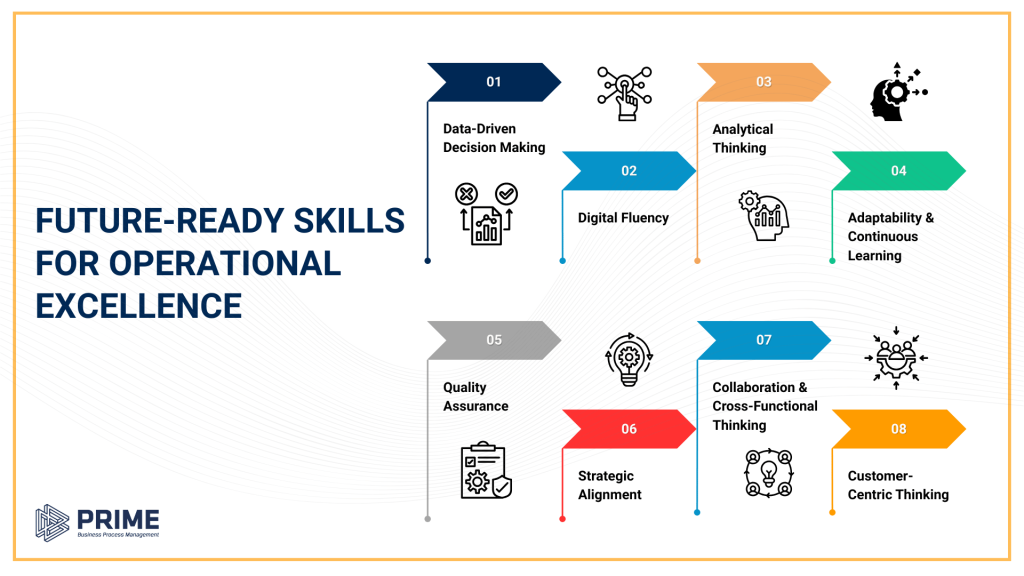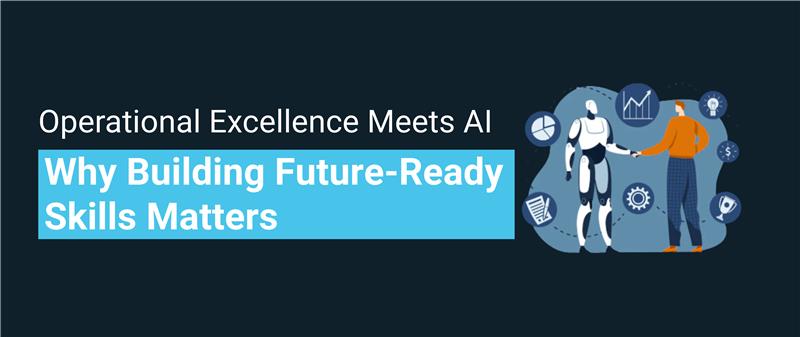TABLE OF CONTENTS
Operational excellence remains the ultimate goal for organizations aiming to deliver superior efficiency, product quality, and customer satisfaction. Yet today, with AI and automation transforming business landscapes, operational excellence can no longer rely solely on technology adoption. Organizations need to build teams with future-ready skills.
According to a recent McKinsey survey, nearly 60% of executives report that their biggest challenge in digital transformation isn’t adopting new tools—it’s enabling their workforce to keep pace. This reality underscores a powerful truth: technology alone doesn’t drive excellence; people do.
To truly sustain high performance, businesses need skilled teams that adapt quickly, learn continuously, and collaborate effectively with intelligent tools. AI excels at automating repetitive tasks and analyzing vast amounts of data, but people bring the creativity, judgment, and intuition indispensable for making meaningful decisions and driving real impact.
Achieving operational excellence in today’s world means cultivating a future-ready workforce that combines human strengths with AI-driven process intelligence.
Why Future-Ready Skills Matter
While organizations invest heavily in AI tools and process technologies, many still struggle to realize their full potential. The reason lies in a widening skills gap—a disconnect between the capabilities technology provides and the skills employees possess to leverage them effectively.
Employees may understand the “how” of using technology, but often lack the analytical, strategic, or adaptive mindset to use it as a driver for continuous improvement. Bridging this gap through focused BPM capability development and employee upskilling for BPM is essential for achieving sustainable operational excellence.
Future-Ready Skills for Self-Sufficient, High-Performing Teams

Future-ready skills equip employees to navigate change, leverage data, and continuously improve processes. These capabilities extend beyond technical know-how to include mindset shifts and strategic thinking essential for ongoing success.
Data-Driven Decision Making
Data is at the core of operational insights. Future-ready professionals are confident in interpreting complex data sets, discerning trends, and using evidence to inform process optimization and strategic decisions.
Digital Fluency
Digital fluency means understanding the tools and systems that power modern workflows, enabling employees to adopt new technologies like advanced BPM tools smoothly and integrate them into everyday operations.
Analytical Thinking
Analytical skills help teams break down complex problems, assess process gaps, and create actionable solutions based on data-driven analysis. These skills enable targeted improvements and reduce inefficiencies.
Adaptability and Continuous Learning
The pace of change demands flexibility. Forward-looking organizations foster culture valuing ongoing learning, where employees embrace change, develop new skills quickly, and innovate continuously.
Quality Assurance
Maintaining high standards at every process stage is vital to operational excellence. A focus on quality assurance helps reduce errors, ensure compliance, and consistently meet customer expectations.
Collaboration and Cross-Functional Thinking
Future-ready teams think beyond silos. Collaboration across departments ensures that process improvements are interconnected and contribute to enterprise-wide efficiency. When teams share insights and understand dependencies, they make smarter, faster, and more cohesive decisions.
Strategic Alignment
Operational improvements should align with the organization’s broader objectives. Strategic alignment ensures BPM process ownership and that every improvement contributes to long-term organizational growth.
Customer-Centric Thinking
In the pursuit of operational excellence, customer-centricity is non-negotiable. Future-ready professionals design and improve processes with the end user in mind—ensuring every change enhances customer experience, satisfaction, and loyalty. By aligning internal efficiency with external value delivery, organizations create operations that are not only effective but truly impactful.
How AI-Powered BPM Software Empowers Teams in the Age of AI
AI has transformed Business Process Management into a strategic enabler of operational excellence, empowering teams to work smarter, faster, and more efficiently. Instead of managing workflows manually, employees now collaborate with intelligent and AI-powered BPM systems like PRIME BPM that guide, analyze, and optimize every process step—turning complexity into clarity.
Here’s how AI-powered BPM tools enable high-performing, self-sufficient teams:
1. Effortless Process Mapping
AI simplifies process documentation by speeding mapping with the capabilities to help design process maps without being process experts. Built-in best-practice comparisons and automated gap analysis help teams identify inefficiencies and improve workflows quickly, making process mapping accessible to everyone, not just experts.
2. Conversational and Insightful BPM
With conversational AI, users can interact naturally with their BPM system. Simple prompts like “Show me the process maps updated last week” deliver instant results, eliminating time-consuming searches and enabling teams to access information when they need it.
3. Smart Analysis and Instant Reporting
AI-powered BPM tools generate customized insights and reports on demand. Teams can request analytics in plain language—such as “List all compliance processes updated this month”—and instantly receive structured, actionable insights, enabling faster, data-driven decisions.
4. Quality and Compliance Reinforced by AI
AI has the capability to automatically detect gaps in processes by flagging missing steps, compliance gaps, or process errors. It suggests best-practice recommendations to ensure every process meets organizational standards—leading to cleaner maps, faster approvals, and improved compliance.
5. Automation and Continuous Improvement
AI not only automates repetitive tasks but also identifies automation opportunities—driving process transformation with AI and ensuring continuous process optimization.
By simplifying complex process work and amplifying human decision-making, AI-powered BPM drives continuous operational excellence, helping businesses achieve speed, accuracy, and agility across every function.
Building a Culture of Continuous Improvement and AI Readiness
Technology provides the tools, but culture provides the momentum. Operational excellence flourishes when BPM methodology, learning, innovation, and collaboration are ingrained in everyday work.
Leaders play a crucial role in building this culture by championing continuous learning, rewarding experimentation, and positioning AI as a partner rather than a replacement. When employees see technology as an enabler of their potential, adaptability becomes instinctive—and excellence becomes continuous.
A future-ready culture prioritizes learning agility over static expertise, ensuring that every improvement is not just implemented but sustained.
Process, and Technology: The Core of Future-Ready Operational Excellence
Operational excellence in the future depends on integrating people, processes, and technology into a seamless ecosystem.
- People provide insight, creativity, and emotional intelligence—qualities AI cannot replicate.
- Processes bring structure, consistency, and clarity.
- Technology delivers speed, scale, and data-driven intelligence.
Together, these pillars enable organizations to anticipate change, respond rapidly, and innovate sustainably.
The future-ready organization is adaptable, leveraging technology to empower people rather than replace them. Its workforce is skilled at reading data, interpreting insights, collaborating across functions, and making agile decisions.
This continuous interplay of skill, innovation, and discipline exemplifies operational excellence in motion—one that balances technology’s strengths with human ingenuity.
Empowering Teams, Elevating Operations
Process clarity and cutting-edge technology lay the groundwork for operational excellence. But ultimate success hinges on skilled, adaptable people who can leverage these tools effectively.
Organizations that invest equally in BPM learning programs and AI-powered process intelligence are better positioned to navigate complex, evolving markets. Empowering employees with future-ready skills enables quicker adaptation, stronger collaboration, and more impactful decision-making.
That’s where PRIME BPM creates value. It’s an end-to-end cloud-based BPM tool empowering organizations to streamline operations. Its AI-powered process mapping, analytics, and intuitive interface help organizations bridge the gap between process design and execution—turning employees into confident process champions.
Alongside its powerful software, it also offers practical BPM training and crash courses to upskill the teams to be future-ready and strengthen process understanding.
Operational excellence becomes easy to achieve when capable people, the right tools, and the right processes are working in sync every day.
Ready to empower your teams and elevate your processes?
Discover how PRIME BPM can help your organization build lasting capabilities and achieve sustainable operational excellence. Contact us today to learn more.




